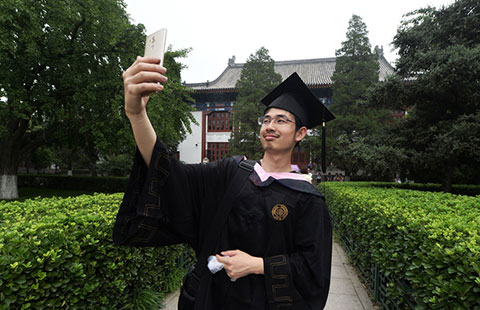Entrepreneurs flock to Xixian's innovation area
By Hao Nan (China Daily) Updated: 2016-07-01 10:14The Cloud Valley is the closest thing possible to an entrepreneur’s heaven, said Hu Ge, a young businessperson in Xi’an, Shaanxi province.
The 28-year-old’s software company entered a development fast track only eight months after locating in the valley, thanks to a series of supportive policies such as cheap office rental and free water and electricity.
A key project in Fengxi New City in Xixian New Area, the Cloud Valley is positioned to become one of China’s largest innovation and business incubation centers for startups in such sectors as cloud computing, e-commerce, software development and electronic manufacturing. It can accommodate a total of 2,000 people.
Last year, Fengxi organized a youth innovation and entrepreneurship competition that attracted over 20,000 participants and gathered around 1,600 projects. Currently, about half of the top 60 projects are located in the valley.
The valley is, however, not the only innovation project in Xixian New Area.
The State-level urban and industrial development zone, which lies between Xi’an and the neighboring city of Xianyang, is emerging as the center of “Greater Xi’an” – an area covering Xi’an, Xianyang and Xixian.
The General Office of the State Council announced on May 18 that Xixian was included in the first batch of 28 national demonstration bases for mass innovation and entrepreneurship.
Five days after the announcement, Wang Fei, deputy head of the new area’s administrative committee, met with Liu Song, vice-president of the Alibaba Group, to discuss future development cooperation. The meeting was believed to have historic significance. “Cooperation between Xixian and Alibaba will multiply the policy effects of serving as the national demonstration base for mass innovation and entrepreneurship,” Wang said.
Over the past five years of its construction and operation, Xixian has gathered a group of projects involved in airport economy, modern agriculture, medical care, culture and tourism, and attracted many Fortune Global 500 companies and Chinese top 500 enterprises including Microsoft, GE Lighting, Brilliance Auto, China Unicom and China Mobile.
“We try to provide the best ecological environment, high-quality facilities and professional services to both startups and matured companies,” said Liu Yubin, deputy director of Xixian New Area’s administrative committee and director of the area’s Fengxi New Town.
In May, Xixian announced the establishment of a fund totaling at least 50 billion yuan ($7.6 billion) during this year’s Silk Road International Exposition to subsidize companies and introduce new talents.
The new area has already attracted almost 3,000 entrepreneurs, Liu said.
Sound public support facilities have also played an important role in attracting people. Xixian has built almost 47,000 affordable houses and is home to 20 schools, from primary to senior high level, and several well-equipped hospitals.
On June 25, the Maple Leaf International School, which features international and bilingual education, welcomed more than 200 students and parents to its open house.
The school, with an investment of 450 million yuan, can enroll a maximum of 5,500 students. Graduates will get a diploma that is recognized by both Chinese and Canadian educational bureaus, and can apply for universities in English-speaking countries and regions around the world.
The first branch of Tsinghua University High School outside Beijing is also located in the new area. The Beijing headquarters will directly manage the boarding school and its teachers.
The new area has five new towns: Jinghe, Konggang, Qinhan, Fengdong and Fengxi. They are linked by 557-kilometer-long roads, four bridges and Subway Line 1.
Nine ministries and administrations have data backup centers located there, including the National Population Information Processing and Backup Center, and the State Forestry Administration and Ministry of Finance has also established two centers in the area.
The centers have attracted more than 30 upstream and downstream firms to provide support services, such as Future International, Sofmit Group and China National Software and Service Co.
In 2013, Microsoft set up an innovation center in the new town, covering a floor area of 2,545 square meters and capable of housing 120 startups. The center has established partnerships with several local colleges such as Xi’an Jiaotong and Northwest universities to jointly build laboratories.
The center plans to nurture at least 60 high-quality software startups by the end of this year.
In addition, an unmanned civil aerial vehicle industrialization project has been carried out in Fengxi.
The project was mainly developed by Northwest Polytechnical University, one of China’s leading aviation, aerospace and marine engineering institutions.
Konggang New Town currently houses more than 20 leading Chinese and overseas logistics and express companies including Singapore-based Global Logistic Properties and Shanghai-headquartered YTO Express.
Qinhan New Town has established cooperation with HP Inc to create Northwest China’s first cloud platform of culture industry.
In Fengdong New Town, telecommunications giant ZTE Corp invested about 2 billion yuan in February to build the company’s largest cross-field R&D industrial zone in China.
It will be used for innovation and the production of energy conservation and environmental protection products, as well as new energy, health and special industry communication products.
- Xi orders more troops to join flood control
- Naval drill is fully within country's 'sovereign rights'
- Drug price reform will 'improve services'
- Xi orders more troops to join flood control
- Ex-diplomat: Philippines must forgo provocations
- 2017 pollution targets 'in reach'
- Li: Ensure safety in flood areas
- China's defense ministry confirms drill in South China Sea
- Li: Piraeus to become 'top-level' gateway
- Response to 'fully depend' on Manila







